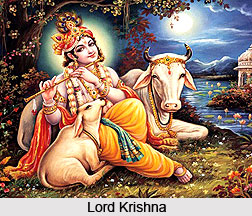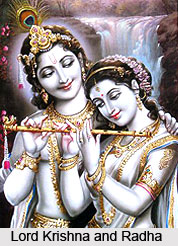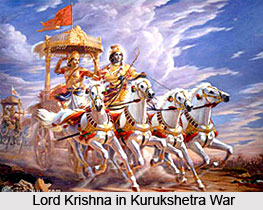 Lord Krishna is the "Avatar" of Lord Vishnu whose influence on human lives far exceeds that of any other God incarnate. Krishna is also depicted as Govinda, who is the principal cause of all causes, the embodiment of wisdom and selfless action as well as a human liberal and practical philosopher with foresight.
Lord Krishna is the "Avatar" of Lord Vishnu whose influence on human lives far exceeds that of any other God incarnate. Krishna is also depicted as Govinda, who is the principal cause of all causes, the embodiment of wisdom and selfless action as well as a human liberal and practical philosopher with foresight.
Etymology of Lord Krishna
Krishna is a Sanskrit term whose literal meaning is black or dark and describes someone with a very dark skin. The Gaudiya tradition explains the primary meaning of the name Krishna is "all-attractive". According to Adi Sankara"s, Krishna is the 57th name of Vishnu and means the "Existence of knowledge and Bliss".
Birth of Lord Krishna
Lord Krishna`s birthday is celebrated as Janmasthami, which is based on scriptural details and astrological calculations. Krishna took birth in the royal family of Mathura and was the 8th son born to princess Devaki and her husband Vasudeva. King Kansa, Devaki"s brother, had ascended the throne by imprisoning his father, King Ugrasena. Afraid of a prophecy that predicted his death at the hands of Devaki"s 8th son, he had the couple cast into prison where he planned to kill all of Devaki"s children at birth. After killing the first six children, and Devaki`s apparent miscarriage of the 7th, Krishna took birth. As his life was in danger he was given to his foster parents Yashoda and Nanda in Gokul. Two of his siblings also survived, Balarama (Devaki"s seventh child, transferred to the womb of Rohini, Vasudeva"s first wife) and Shubhadra (daughter of Vasudeva and Rohini born much later than Balarama and Krishna).
 Legends of Lord Krishna
Legends of Lord Krishna
The stories of Lord Krishna"s plays with the gopis in his growing days were romanticised in the poetry of Jayadeva, author of the Gita Govinda. Krishna as a young man returned to Mathura, killed his uncle Kansa, and made Ugrasena as the king of the Yadavas. Meanwhile, he became a friend of Arjuna and the other Pandava princes of the Kuru kingdom; living on the other side of the Yamuna .He married Rukmini, daughter of King Bhishmaka of Vidarbha. In Vaishnava traditions, Krishna`s wives in Dwarka are believed to be expanded forms of the Goddess Lakshmi.
In the Mahabharata, Krishna was the cousin of both the Pandavas and the Kauravas. He asked the sides to choose between his army and himself. The Kauravas picked the army and he stayed supporting the Pandavas. He agreed to be the charioteer for Arjuna in the great battle of Kurukshetra. The Bhagavad Gita is the advice given to Arjuna by Krishna before the start of the battle. In the Bhakti movement, Krishna was the focus of attention and even with its end and is still an important and popular devotional and ecstatic aspect of Hindu religion, particularly among the Vaishnava sector.
 Teachings of Lord Krishna
Teachings of Lord Krishna
Three great works in Hinduism enumerate Krishna`s Teachings, namely the Bhagavad Gita, Anugita and Udhavagita. Bhagwad Gita is the sacred Book depicting `Mahabharata` for Hindus. The advice Lord Krishna renders to discouraged Arjuna at Kurukshetra, immortalized the Bhagavad Gita, influenced philosophers and continues to inspire millions of people worldwide.
Srimad Bhagavad Gita is the narrations about the relationship between the Supreme Lord and his devotees. In this narration, transcendental nature of the Supreme Lord and his devotees is fully described. Krishna always played the role of a defender of the oppressed. He killed Kansa to unshackle his victims from cruelty. He befriended the poor; the character of Sudama is a legendary character whose berries he ate. He came to rescue of Draupadi. Lord Krishna is also seen as a playmate to cowherds at Vrindavan, a loving and giving soul.
Krishna defined dharma (religion) as something that brought about the good of the individual and society. Krishna`s conversations with Arjun are on transmigration of soul and aims at attaining liberation, descriptions of Karma and effects of austerity. Devotion, meditation and other religious disciplines reflect in Bhagavad Gita. Krishna also touches upon the psychic powers of yogic practices. The love of Gopis is divine which says of the greatness and divinity of Lord Krishna. He is said to create an air of romanticism, enchanted the Gopis and impressed them with the tune of his `bansuri`. Krishna responded by dancing with Gopis in Ras Leela. The mystical passage of Krishna`s life with Gopis and love for Radha is the most marvellous expansion of love expressed in that beautiful play at Vrindavan, which no one can understand yet, become perfectly chaste and pure.
The Harivamsa of Mahabharata is an appendix to this epic and contains the earliest detailed version, starting from birth of Lord Krishna and leading to his childhood and youth. The scenes from the narrative are set in north India, mostly in the present states of Uttar Pradesh, Bihar, Haryana, Delhi and Gujarat. The events in the childhood of Lord Krishna like Kaliya Daman, Mountain lifting by Lord Krishna and others are considered to be sacred by the Hindus.









